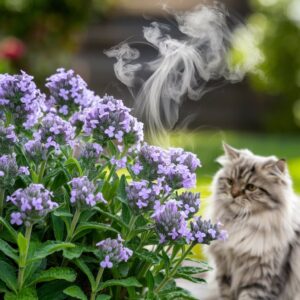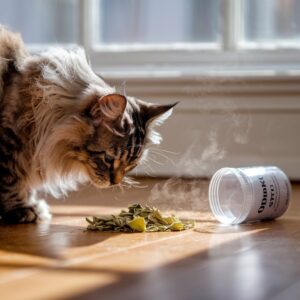High-Quality Catnip: Tips for Avoiding Low-Quality
Lack of Potency and Weak Aroma
One of the most apparent signs of low-quality catnip is the lack of potency. If your cat shows little to no interest in the catnip, it may indicate that it is not high-quality. Additionally, if the catnip does not have a strong aroma, it may indicate that it is not pure or has been sitting on the shelf for too long.
Presence of Stems and Leaves
Low-quality catnip may also contain many stems and leaves, which do not contain as much nepetalactone as the plant’s flowering tops. This can lead to a less effective and enjoyable experience for your cat.
Impurities and Additives
Another sign of low-quality catnip is the presence of impurities or additives. Some manufacturers may add fillers or other substances to their catnip to cut costs or enhance the product’s appearance. These additives can be harmful to your cat and may cause adverse reactions.
Choosing High-Quality Catnip
It’s important to carefully inspect the packaging and choose catnip from pure, organic ingredients to ensure your pet’s safety and enjoyment. By being aware of these signs, you can avoid purchasing low-quality catnip and provide your cat with a safe and enjoyable experience.
 The Benefits of Organic Catnip for Your Feline Friend
The Benefits of Organic Catnip for Your Feline Friend
Organic catnip provides various benefits to your kitty companion. To begin with, organic catnip is grown without synthetic pesticides or fertilisers, so it is devoid of potentially dangerous substances for your cat. This makes organic catnip a safer choice for your pet, especially if they are sensitive or allergic to specific ingredients.
Organic catnip, often grown in more natural and ecological surroundings, offers a higher-quality product overall. This, coupled with its higher potency and scent than non-organic kinds, ensures that your cat is more likely to react strongly and positively when it comes into contact with organic catnip.
The higher concentration of nepetalactone in organic catnip can provide hours of enjoyment and stimulation for your cat, which can benefit their general health.
In addition to being safer and more potent, organic catnip promotes sustainable and environmentally beneficial techniques. By purchasing organic catnip, you support farmers by prioritising ethical and sustainable production practices.
By choosing organic catnip, you benefit your cat and contribute to a healthy environment for all living things. Organic catnip promotes sustainable and environmentally beneficial techniques, supporting farmers in prioritising ethical and sustainable production practices.
Tips for Selecting High-Quality Organic Catnip
When choosing high-quality organic catnip for your feline companion, there are various variables to consider. First, search for catnip made entirely from organic materials. This assures that the product is free of synthetic pesticides, herbicides, and fertilisers that could harm your pet.
Additionally, choose catnip prepared from the plant’s flowering tops, which have the maximum concentration of nepetalactone and are more likely to evoke a significant reaction from your cat. It is also critical to select fresh organic catnip with a strong fragrance. Freshness is essential for catnip, as older or stale catnip can lose its strength over time.
A strong aroma suggests the robust catnip will give your pet a delightful experience. Furthermore, try buying organic catnip from respected brands or suppliers who value quality and purity in their products. Finally, when selecting organic catnip, think about your cat’s tastes.
Remember, each cat is unique and may have specific preferences when it comes to catnip. Some may prefer dried leaves, while others may enjoy catnip-infused toys. By considering your cat’s tastes, you demonstrate your attentiveness and ensure they have the best experience with high-quality organic catnip.
 How to Store High-Quality Catnip to Maintain Its Freshness
How to Store High-Quality Catnip to Maintain Its Freshness
Once you’ve chosen high-quality organic catnip for your kitty friend, you must store it properly to keep it fresh and potent. One of the best ways to do so is to preserve catnip in a sealed container in a cool, dark place. This protects the catnip from light, air, and moisture, preserving its aroma and potency.
Another effective way to store high-quality catnip is to utilize the power of cold temperatures. Storing catnip in the fridge or freezer can significantly extend its freshness. However, using an airtight container is important to prevent the catnip from absorbing odours from the refrigerator or freezer.
If you buy fresh catnip, you can dry it yourself to increase its shelf life. Hang the fresh catnip in a dry, well-ventilated place until it completely dries. Store the dried catnip in a sealed jar in a cold, dark area for later use.
Following these storage guidelines, you can keep your high-quality organic catnip fresh and intense for your feline companion.
Ensuring the Safety of High-Quality Catnip for Your Cat
Monitoring Your Cat’s Reaction
When introducing high-quality organic catnip to your feline friend, it is essential to monitor their reaction. Some cats may respond strongly, while others may show little interest or even exhibit signs of aggression or anxiety.
Precautions to Take
If you notice any adverse reactions, discontinue use and consult with a veterinarian. Moderation is crucial when using high-quality organic catnip, as excessive exposure can lead to overstimulation or digestive issues.
Safe Exposure Guidelines
To prevent potential negative effects, limit your cat’s exposure to catnip to a few times per week. Always supervise your cat when it interacts with high-quality organic catnip-infused toys or products to ensure its safety and prevent accidents or the ingestion of large quantities of catnip.
By taking these precautions and monitoring your cat’s reaction, you can ensure that high-quality organic catnip is a safe and enjoyable experience for your feline friend.
 The Importance of Investing in High-Quality Catnip for Your Cat’s Wellbeing
The Importance of Investing in High-Quality Catnip for Your Cat’s Wellbeing
Investing in high-quality organic catnip benefits your cat’s general health and enjoyment. Catnip provides mental and physical stimulation, allowing cats to remain active and interested. Cats that spend most of their time indoors, away from the elements, would adore this.
High-quality organic catnip can help relieve tension in cats. Cats’ euphoric reactions to catnip can help them relax and unwind, lowering anxiety and increasing overall well-being. Furthermore, providing your kitty buddy with high-quality organic catnip demonstrates your concern for their happiness and enrichment.
Investing in excellent products for your pet improves their overall quality of life and demonstrates your devotion to their well-being. To summarise, high-quality organic catnip benefits your kitty buddy, including cerebral and physical stimulation, stress alleviation, and general enjoyment.
Understanding the difference between high-quality and low-quality catnip, choosing the best products for your pet, storing it correctly, ensuring its safety, and investing in quality products for their well-being will let you give your cherished kitty companion a fun and secure environment with high-quality organic catnip, bringing you joy and satisfaction in seeing them happy and healthy.
For more information on keeping your cat happy and healthy, check out this article on plants that keep stink bugs away. It offers helpful tips for creating a safe and enjoyable environment for your feline friend, including the importance of using high-quality catnip to keep them entertained and stimulated.
FAQs
What is catnip?
Catnip is a mint family herb known for its effects on cats. When cats come into contact with catnip, they may exhibit behaviours such as rolling, rubbing, and purring.
What are the signs of low-quality catnip?
Low-quality catnip may have a dull colour, lack a strong aroma, or contain a lot of stems and leaves. Cats may also show little to no interest in low-quality catnip.
How can I avoid low-quality catnip?
To avoid low-quality catnip, look for products labelled as “organic” or “certified.” It’s also a good idea to purchase catnip from reputable brands or stores specialising in pet products.
What are some alternatives to traditional catnip?
If you’re concerned about the quality of traditional catnip, you can try alternatives such as silver vine, valerian root, or honeysuckle. These plants produce similar effects in cats and may be more readily available in high-quality forms.
References
Discover The Expert’s Guide To Safely Feeding Soup To Cats: Veterinary Tips & Personalized Advice. https://catspatrol.com/is-cats-and-soup-safe/
What is Catnip and Why Do Cats Love It? – Cats Guru. https://www.catsguru.com/what-is-catnip/
Food Puzzles Makes Cats Healthier, Calmer, And Less Aggressive | IFLScience. https://www.iflscience.com/food-puzzles-makes-cats-healthier-calmer-and-less-aggressive-37706
The post Catnip How to Spot Low-Quality and Buy Only the Best appeared first on Unity Pets.
The Article Catnip How to Spot Low-Quality and Buy Only the Best Was Found On https://limitsofstrategy.com

Your insights on selecting high-quality catnip truly resonate with me, especially regarding the importance of aroma and potency. I’ve had my share of experiences with catnip that seemed to excite my feline friends one moment and left them utterly indifferent the next. It can be quite baffling, particularly when the packaging touts a premium product but fails to deliver.
It’s great to hear your thoughts on the topic. It really can be a roll of the dice when it comes to finding catnip that hits the mark. The variability in reactions is fascinating but frustrating, especially when you’re committed to giving your furry friend the best.
I can definitely relate to the unpredictability of catnip. It’s interesting how some cats can be completely indifferent while others get so animated. I’ve tried a few different brands and even some homegrown varieties, and it’s always a hit or miss. I’ve read that the reaction can be influenced by genetics, and I wonder what other factors play a role.
It’s interesting to hear your experiences with catnip, especially how the reactions can vary so much from one product to another. Many cat owners have noticed that the potency and aroma really play a big role in how cats respond. There’s a lot more to catnip than just being green and leafy. The freshness and quality can make a significant difference.
You bring up such a valuable point about the variability in catnip products! It really is fascinating how not every cat responds the same way, even to what seems like similar offerings. I remember experimenting with different types of catnip over the years—everything from dried leaves to catnip-infused toys. Each experience has been unique.
You bring up such a valuable point about the variability in catnip products! It really is fascinating how not every cat responds the same way, even to what seems like similar offerings. My own cat, for instance, barely notices when I sprinkle dried catnip on her toys but goes absolutely wild over catnip bubbles. Every time I blow them, it’s like I’ve unleashed a playful frenzy in her.
It’s really interesting how each cat has their own unique preferences when it comes to catnip. Your experience with the catnip bubbles is such a fun twist on the typical offerings. I’ve heard that the method of delivery can definitely influence how they react—like how some cats may prefer those more interactive formats, while others enjoy the simple aroma of dried catnip.
I find it fascinating how different cats can be when it comes to their interactions with catnip. You’re right about the delivery method; I’ve noticed a clear distinction in how my cats respond. One of my cats prefers the dried leaf form, just rolling around in it and getting all excited, while the other seems to get bored with that and perks up at anything that involves a bit of play, like those catnip-filled toys that require some chasing.
It’s wild, right? Catnip really is the enigma wrapped in a green leaf. Sounds like your kitty has an interesting palate, preferring to channel her inner party animal with catnip bubbles instead of the classic sprinkle method. I mean, who can blame her? There’s something undeniably magical about bubbles. They float, they shine, and they have that whole “catch me if you can” vibe!
You bring up a really interesting point about catnip’s variability. It’s fascinating how something that seems so simple can evoke such distinct responses. I’ve noticed that my cats have different reactions depending on the source, too. There’s a brand I tried once that had a much stronger aroma, and both of my cats became absolutely playful and animated. Meanwhile, I’ve also found some that barely elicited any reaction at all.
Your experience with catnip truly highlights the unpredictability many pet owners face when trying to choose products for their cats. The varying reactions can often make us question if our pets are simply fickle or if the product itself isn’t living up to its promises. The reality is that catnip quality can fluctuate significantly, and not all brands are created equal.
This post raises some crucial points about choosing high-quality catnip. I’ve noticed a significant difference in my cats’ reactions when I switched from a generic brand to a more reputable one. They were utterly indifferent to the low-quality stuff, which was quite disappointing.
It’s interesting how much of a difference quality makes, isn’t it? I had a similar experience with my cats; they seemed to come alive with a good brand. I had always assumed that catnip was catnip, but after trying a higher-end version, it was like a switch was flipped. They play more energetically and seem genuinely happier, which made me curious about what actually goes into these products.
I completely understand where you’re coming from. It’s fascinating how something as seemingly simple as catnip can have such a profound impact on our pets. After trying out a premium brand for my own cats, I noticed similar changes in their behavior. It’s almost like they can sense the difference in quality, and it really got me curious about the ingredient sourcing and how it can vary so much from one product to another.
It’s interesting how something that seems so straightforward—like catnip—can really influence our pets in ways we might not expect. You’re spot on about the sourcing. The quality of catnip can vary widely depending on where it’s grown and how it’s processed. Some brands cut corners, but premium options often ensure better cultivation practices and fresher herbs, which likely explains the heightened reaction you noticed.
It’s great to hear about your experience with switching to a higher-quality catnip. It’s fascinating how sensitive our feline friends can be to the quality of what we offer them. Many cat owners overlook this detail, thinking any catnip will do, but your observation about the difference speaks volumes.
I found your insights on catnip quality really helpful! It’s surprising how many pet owners, myself included, might overlook these factors. My own cat, Luna, has always been picky about her catnip, and I’ve never thought to analyze the quality much until now. Last week, I bought a new brand that boasted “premium” status, but I noticed it lacked that potent scent she usually loves. It makes me wonder how much of it depends on proper storage and freshness as well.
It’s interesting how many pet owners face the same issue when it comes to their cats and catnip. Luna’s pickiness might be more common than we think! When you mention that “premium” catnip lacking potency, it really highlights the importance of looking beyond marketing labels. Freshness is such a key factor—once catnip is harvested, its essential oils can degrade over time, especially if it’s not stored properly.
I’m glad you found the insights helpful! It’s interesting how catnip can really vary in quality and how sensitive our feline friends can be to it, just like Luna. If she’s usually picky, it might be worth experimenting a bit more with storage and freshness, as you mentioned. Catnip can lose its potency when exposed to air, light, or heat, so keeping it in a cool, dark place and sealing it well after you open it can make a big difference.
I completely agree that quality really makes a difference when it comes to catnip. I’ve noticed that my cats are much more responsive to the high-quality stuff, especially when it’s fresh and fragrant. It’s fascinating how some catnip out there has barely any scent; I think that’s when the disappointment kicks in.
You’re touching on a key point when it comes to catnip. Freshness really does elevate the experience for our feline friends. The essential oils in catnip are what trigger that euphoric response in cats, so when you’re working with higher-quality, fresher catnip, those oils are at their peak. It’s interesting to see how the different forms of catnip—whether it’s dried, fresh, or even in toys—impact how cats react.
I totally get what you mean about the difference in quality. There’s something special about fresh catnip that just seems to bring out the best in our cats. I’ve found that when I splurge a little on organic or locally sourced catnip, it makes a noticeable difference in how my cats react. They seem more energized and engaged during playtime.
It’s really interesting how different quality levels of catnip can affect our cats’ reactions. I’ve also noticed that when I get the good stuff, my cats seem to have a more vibrant and playful response. There’s just something about the fresh, fragrant kind that makes it a real treat for them.
It’s interesting how the right environment can make such a difference, much like with quality catnip; I found a great article on smoothly introducing a newborn to a cat that covers some helpful tips.
‘Tips for a Smooth Transition: Introducing a Newborn to a Cat’
https://brokendolls.org/tips-for-a-smooth-transition-introducing-a-newborn-to-a-cat/.